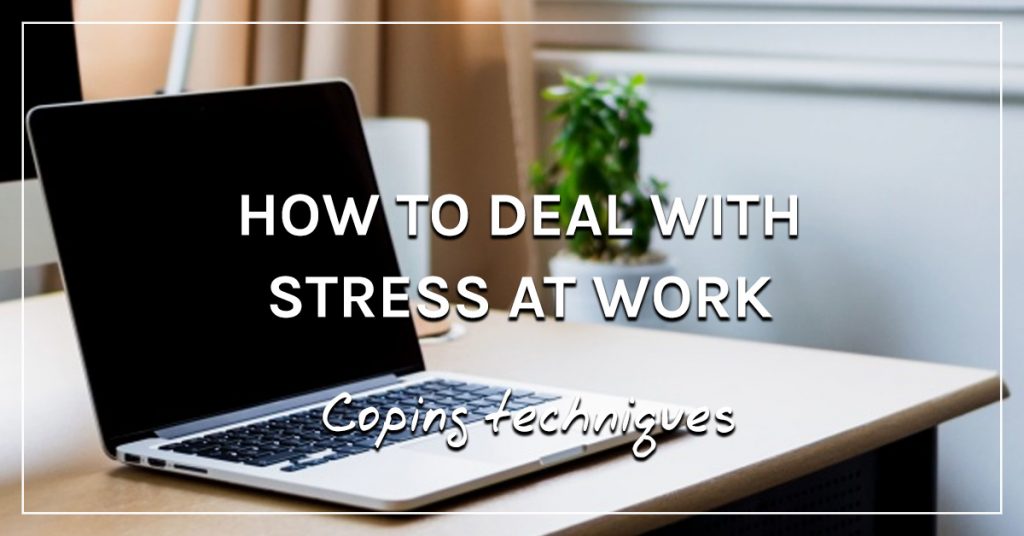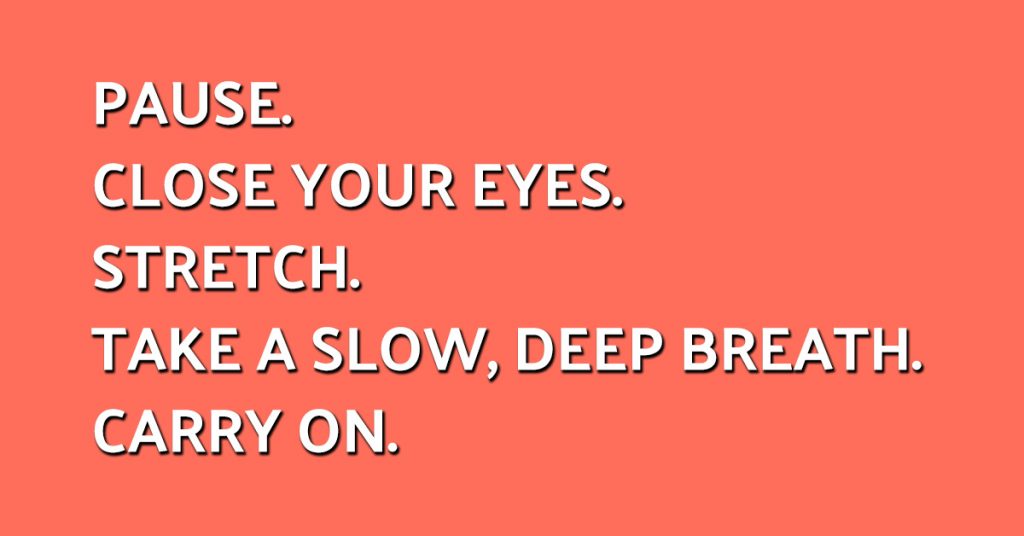This post may contain affiliate links. If you click on an affiliate link and buy something, I get a percentage of the sale. Find out more by reading my affiliate policy and disclosure.
Unless you are lucky, chances are high that at some point you’ll have a bad day at work.
A project goes wrong. Traffic sucks and you’re late to a meeting. You send an email to someone you wanted to impress with a typo in the subject line. Your customers are particularly unpleasant and entitled. Or maybe you have to deal with the client from hell.
I, myself, have been experience a higher than normal level of stress at work recently. So I decided to write a post about how I handle it.
Firstly:
Some stress at work is okay!
Stress is one of those interesting things. In short manageable bursts it functions a bit like exercise. It stretches our comfort zone, and gets us used to dealing with situations that make us a little bit anxious.
For example, if you hate public speaking? Doing a short public talk in front of a few colleagues is actually a really good way to manage your fear and get better at a useful skill.
But if stress extends for weeks or months, or if stress is completely overwhelming, it becomes damaging and negative.
For example, if you don’t like public speaking and your job involves speaking to large groups of people every day? Or if you suddenly get thrown into a high pressure conference at the last minute with massive consequences riding on your performance?
Either of those situations is just going to exacerbate your underlying fear and make you miserable.
If you’re in a short term stressful activity? Try and embrace it. Tell yourself that this is an opportunity to deal with fear. Use mindfulness techniques such as deep breathing, or go for a brisk walk to work off adrenaline. Keep the activity in perspective – it’s unlikely to have lasting consequences even if it does go wrong.
But if you have ongoing or overwhelming stress? The first thing you need to know is how to recognise it:
How to recognise stress at work
Too much stress leads us to feel:
- Overwhelmed or panicked (look for feelings of ‘I can’t do this’)
- Depressed or disengaged (look for an inability to make decisions and difficulty in focusing)
- Over emotional (look for extreme reactions like bursting into tears or out of character anger)
- Unable to sleep (look for anxious thoughts swirling around in your head when you try and sleep)
- Like we need a break (have you started drinking more in order to ‘unwind’ or ‘cope’?)
- Nervous or twitchy (do you find yourself hyper aware of small sounds and background noise?)
Sometimes stress can overcome us without us really noticing – like a frog in water that is slowly brought up to boiling temperature. We agree to more and more responsibility. A colleague leaves, and we’re asked to cover for them temporarily, but then we have to keep covering that extra work on for weeks or months. Our favourite manager leaves, and a new manager is appointed that we don’t get on with as well, and we start to feel belittled or overlooked.
And slowly, slowly, the temperature rises.
It’s important to remind yourself to check in every now and then. How’s your job making you feel? Would you apply for your own job, if you were job hunting?

How to deal with stress at work: quick techniques to manage stress
Quick and easy things you can do to immediately de-stress:
Stop. Take a deep breath. Stretch. Then continue.
You can do this anywhere, at any time. It isn’t a magic wand, and it won’t make whatever is stressing you out go away. But deep breathing helps calm the nervous system. Stretching helps alleviate headaches and reminds us to pay attention to our body.
Of course, the trick is remembering to do this! The best way I’ve found is to set a reminder on your computer or on your phone to remind you to do this every hour.

Make a habit of going for a walk at lunchtime.
When you are super busy, it can feel difficult to step away from your desk or workstation for even 10 minutes. But a 10 minute walk will make you more focused, more alert and better able to handle the afternoon.
It’s actually more important to step away from your desk when you’re stressed and overwhelmed, as it will help you get perspective.
Commit to going for a walk every lunchtime. It doesn’t have to be a long walk – even just five minutes around the block will help.

Find a mantra that works for you.
A mantra is a short statement of intent. Saying something like “I am calm” helps reinforce that feeling to yourself and actually makes you feel calmer.
The trick is to find a mantra that actually resonates with you. Here are a few options:
- This too shall pass
- I am calm
- Smile, breathe, and go slowly
- Let it go*
- I honour myself
*unless this has been destroyed by a certain Disney cartoon!
Write your mantra on a post-it note and stick it somewhere you can see it. Your computer monitor, your locker at work or even your bathroom mirror so you see it when you wake up.

Take a holiday
This, obviously, isn’t always possible. But if you can take a holiday, you should. It gives you a chance to get out of the situation and when you come back you will see it with fresh eyes.
Even a weekend away will help. The best holidays are to go somewhere where you can disconnect. This might be camping in the mountains, it might be an impromptu beach break or it might be a visit to a spa weekend.
But the key is to disconnect from work completely. No email, no phone calls, no contact with work colleagues. Do something unchallenging and relaxing – like walking, swimming, sunbathing or reading fun fiction.
Exercise
Exercise is good. for. everything. It reduces stress hormones like cortisol. It boosts mood elevators like endorphins. It’s been linked to more self confidence, better mood, less anxiety… it’s just a good thing to do, no matter what.
Almost any type of exercise will help reduce your stress levels. Burn off stress and boost your mood with some zumba or dance exercise. Take solace in the solitude and moving meditation of a long run. Get invigorated by the deep stretches and tension relief of a yoga class. Or you might want the boost of feeling stronger by doing a strength workout.
You can check out your local exercise classes, or you can start a workout programme at home.

Talk to someone
Vent to a friend, your partner, your family or a counsellor. It’s important that you have a space where you can talk through your problems and – yes – complain.
They should help remind you of how awesome you are, and talking through your problems can help you contextualise them and figure out solutions.
How to deal with stress at work: tackle the underlying issues
The above methods will help you reduce the impact of stress on your life. But if you are chronically stressed, the above is just a band aid on a wound that continues to bleed. At some point you will have to tackle the underlying issues at work that are causing you to feel stressed.
Talk to your manager or HR department
Stress at work is something that most companies will recognise as a health and safety issue. Larger organisations in particular will have a policy around workplace stress. Talk to your manager in the first instance (unless your manager is part of your general feelings of stress).
Prepare for the meeting by writing down a bullet point list of the factors that you believe are contributing to your stress. The more evidence you can provide, the better. For example:
- The work load is too high: I have had to do unpaid overtime three or four times a week for two months.
- I feel that I have not had sufficient training to undertake (this part) of my job.
- I feel that there are a lot of ad-hoc jobs being sent my way, and I’m worried this is affecting my ability to do my normal job.
Be careful about the way you phrase things. This isn’t a session for you to vent. Be especially careful about complaining about specific people or behaviours, unless you can back it up with evidence.
(Note that this isn’t a post about how to deal with bullying in the workplace.)
The most important thing is to take this to your manager or HR department as a problem you want to help solve. Propose some changes that you think will help reduce your level of stress, such as:
- Prioritising your workload and removing things that are low priority
- Getting additional training to help you feel more comfortable with tasks that are currently overwhelming you
- Re-distributing your workload, or training a colleague to help you with aspects of your job
If you are extremely stressed, you might also consider:
- Requesting reduced hours
- Shifting to a different role or department
Talk to your GP
Stress is a medical condition, and your GP is an extremely important resource in helping you deal with it.
Book your appointment and take a bullet point list of what you want to discuss. Focus on the symptoms of stress that you have noticed, particularly feelings of panic, anxiety, stress headaches, stomach aches, a racing heart beat etc.
Your GP can provide advice on managing stress, can sign you off work and can prescribe medication to help you cope with feelings of anxiety or depression.
Change the workplace culture
Workplace culture doesn’t come about in a vacuum. If one or two people start working through lunch, staying late, or engaging in whisper campaigns and other forms of ‘office politics’, it spreads. If nobody combats it, eventually that becomes ‘just the way things are’.
The good thing about is that it is possible to change workplace culture to something more positive. And every employee has the power to change the culture. In many ways, the people ‘on the floor’ have more control over culture than managers.
Of course, it’s easier said than done. Changing an entrenched workplace culture takes a lot of work, some luck and a bit of support.
So how might you go about it?
First, set a good example:
- Take your lunch break, and as you do so talk about how important lunch breaks are for productivity.
- Leave your workplace on time. (Side note, some industries like health care make this impossible. Do what you can, without putting people at risk.)
- Don’t join in negative gossip, endless complaining or general negativity.
Then, try and improve the mood in your workplace:
- Decorate your workspace with fun things.
- Give people random (fun) gifts like badges or stickers.
- Send thank you notes and/or be generous with praise.
- Get a workplace mascot and hold a naming competition.
- Start Friday night drinks (or Friday afternoon coffee).
- Ask for help (people love to feel helpful).
- Have an ‘office clean-up day’. Or a clean up hour.
- Acknowledge other people’s work and successes in meetings.
- Avoid getting sucked into ‘bitch fests’ where you all complain about the work, the people or unsolvable problems.
- Encourage conversations that talk about how good the work is: “This place is so cheerful compared to my previous place of work!” or “Gosh, I had the nicest customer today, she was such a sweet old lady.”
- Encourage conversations about improving your workplace. “Wouldn’t it be nice if we got a few plants in here?” or “Do you think the manager would approve getting someone in to clean the carpets and refresh them a bit?”
It will mean stepping up and taking a bit of responsibility. That’s okay, it’s good experience.
Make an escape plan
If you have talked to your manager and HR department without success, it may be time to think about an escape plan.
It’s important to not quit in a panic, because you may end up in another stressful situation (that of having no money).
Instead, create a plan to find another job. You may be okay with taking something that pays you less money if it means you get out of a toxic environment.
At the same time, cut back on your expenses and start saving an ‘escape fund’ that will buy you a couple of months of living expenses. That’s your survival money in case things do become so unbearable that you have to quit.
And finally: is it the job or is it you?
If you have found yourself becoming overwhelmed with stress at most or all jobs you’ve undertaken, the issue may be less with your workplace and more to do with the mental narrative you’ve created for yourself.
We all have scripts that dictate the way we view and interact with the people and world around us. A bad experience at our first job, a poor model for dealing with stress from parents or colleagues… there are so many ways that we can learn damaging scripts about ourselves and our relationship with work.
Unfortunately, there is no shortcut for overcoming this. You need to do the work to challenge your scripts. That’s a subject for another blog post — but a good counsellor is a first step.
Such a helpful post. Definitely worth noting xx
Thank you 🙂
This reminds me why I enjoy working from home so much lol
Debbie
Ha! One day! 😀
Oh, this post is so useful and very informative! As a creative business owner stress is such a no-no as I often get in a creative block. Thank you for a wonderful post and blog.
Thank you! And yes, dealing with stress is definitely an important part of being a business owner 🙂